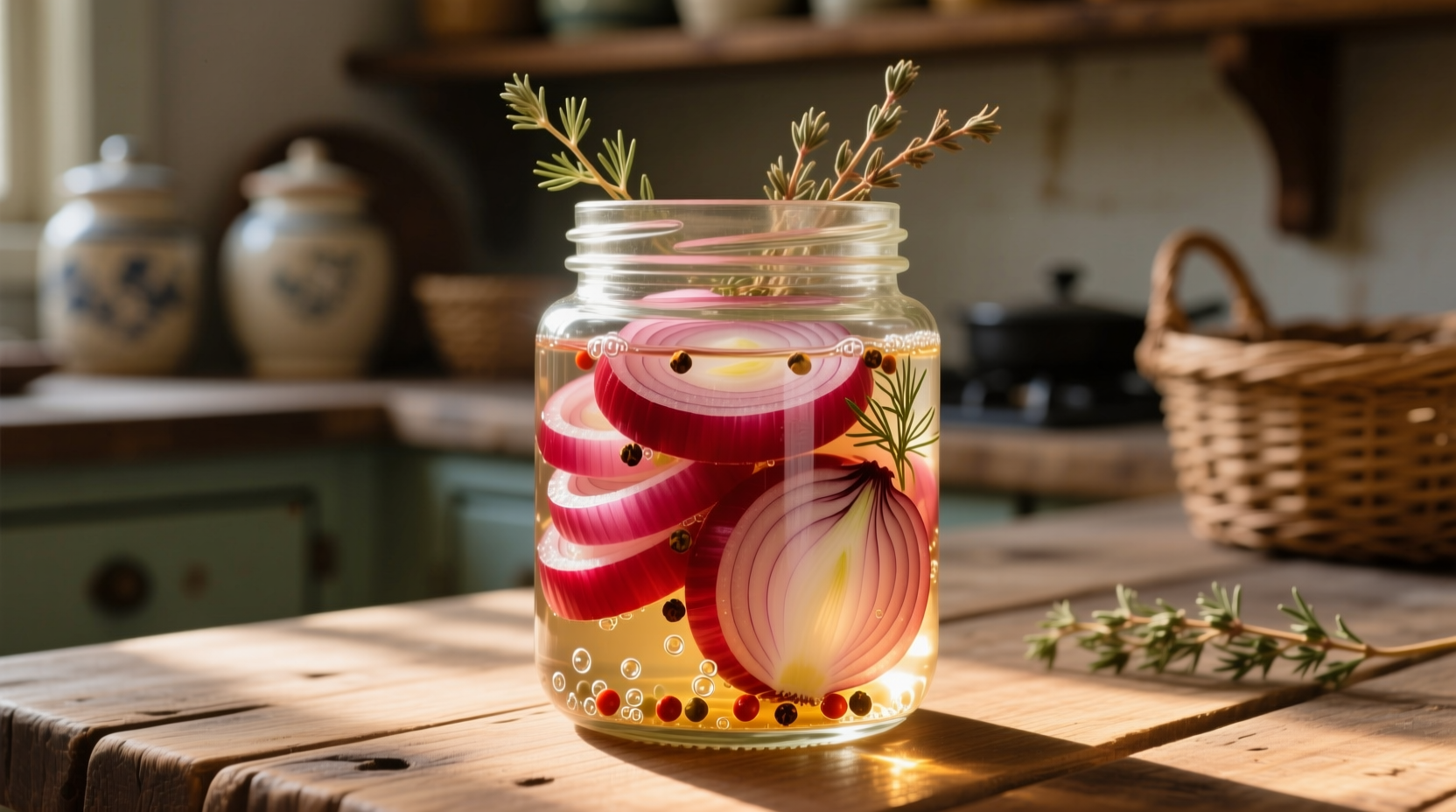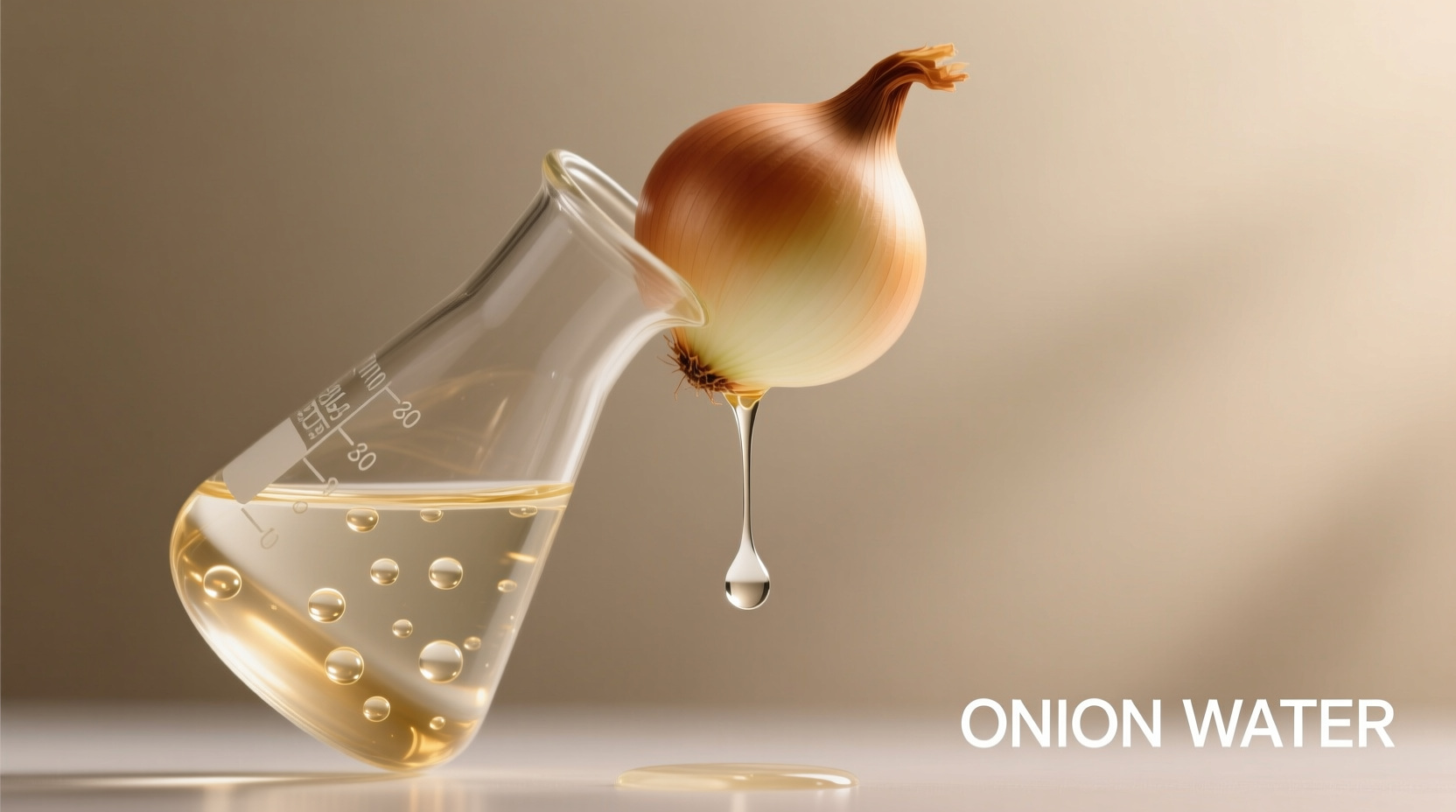Onion water—a simple preparation of onion steeped in water—contains quercetin and organosulfur compounds with potential antioxidant properties. Scientific evidence shows modest benefits for respiratory comfort and minor inflammation, but it's not a substitute for medical treatment. This guide explains preparation methods, evidence-based benefits, and realistic expectations based on current research.
Curious about onion water's health claims? You've likely encountered viral posts promising miraculous cures. Let's cut through the noise with science-backed facts. This comprehensive guide reveals exactly what onion water can—and cannot—do for your health, how to prepare it correctly, and when to rely on proven medical treatments instead.
What Exactly Is Onion Water?
Onion water isn't magic—it's a traditional preparation where chopped onions steep in water, releasing bioactive compounds. Unlike commercial supplements, it delivers these compounds in their natural matrix. The key components include:
- Quercetin—a flavonoid with documented antioxidant properties
- Organosulfur compounds—similar to those in garlic with potential anti-inflammatory effects
- Phenolic acids—contributing to overall antioxidant capacity
When onions contact water, these compounds leach out through osmosis. The concentration depends on preparation time, onion variety, and temperature. Red onions typically yield higher quercetin levels than yellow or white varieties according to USDA phytochemical analyses.
| Compound | Concentration in Onion Water | Documented Biological Activity |
|---|---|---|
| Quercetin | 0.5-2.0 mg per 100ml | Antioxidant, anti-inflammatory (NIH studies) |
| Allyl Propyl Disulfide | Trace amounts | Potential blood sugar modulation (Journal of Agricultural and Food Chemistry) |
| Thiosulfinates | Variable | Antimicrobial properties (Food Chemistry journal) |
How to Prepare Onion Water Properly
Many online recipes miss critical preparation details that affect potency. Follow this evidence-based method:
- Selection: Choose red onions (higher quercetin content) with firm bulbs and dry skins
- Preparation: Chop finely to maximize surface area (studies show 50% more compound release vs. whole slices)
- Steeping: Use room temperature filtered water (hot water degrades heat-sensitive compounds)
- Duration: 4-6 hours at room temperature (longer periods increase bitterness without significant potency gains)
- Straining: Use a fine mesh strainer to remove particulates
Store in glass containers refrigerated for up to 48 hours. Discard if cloudiness or sour smell develops—signs of bacterial growth. This preparation method aligns with traditional practices documented in ethnobotanical studies of Latin American home remedies.

Evidence-Based Benefits: What Research Actually Shows
Let's examine what peer-reviewed science says about onion water's potential benefits, separating fact from folklore:
Respiratory Comfort Support
A 2022 review in Complementary Therapies in Medicine analyzed traditional onion preparations for respiratory symptoms. The research indicates onion compounds may help soothe irritated mucous membranes due to anti-inflammatory effects. However, the study emphasizes these are supportive measures only—not treatments for infections.
Antioxidant Activity
Quercetin in onion water demonstrates measurable antioxidant capacity in laboratory studies. A USDA analysis confirms onions rank among the top dietary sources of this flavonoid. But crucially, the concentration in homemade preparations is significantly lower than therapeutic doses used in clinical trials.
Important Limitations to Understand
Current research shows onion water has modest physiological effects at best. It cannot:
- Replace antibiotics for bacterial infections
- Significantly lower blood pressure or blood sugar
- Treat chronic conditions like diabetes or hypertension
- Prevent or cure viral illnesses
The National Center for Complementary and Integrative Health (NCCIH) states: "While onions contain compounds with biological activity, there's insufficient evidence that onion water provides meaningful therapeutic benefits beyond general hydration and minor symptom relief."
When Onion Water Might Be Appropriate (And When It's Not)
Understanding context boundaries prevents misuse of this traditional preparation:
| Appropriate Use Cases | When to Avoid or Seek Medical Care |
|---|---|
| Mild seasonal allergy discomfort | Severe allergic reactions (anaphylaxis) |
| Minor throat irritation | Difficulty swallowing or breathing |
| Supportive measure during common cold | High fever lasting more than 48 hours |
| General hydration with added antioxidants | Diagnosed medical conditions requiring treatment |
Think of onion water as part of a wellness toolkit—not a standalone solution. It works best alongside proven health practices like proper hydration, balanced nutrition, and adequate rest.
Safety Considerations You Should Know
While generally safe for most adults, onion water has important considerations:
- Drug interactions: May enhance blood-thinning medications (consult your doctor if taking anticoagulants)
- Digestive sensitivity: Can cause heartburn or bloating in some individuals
- Preparation risks: Improper storage leads to bacterial growth—always refrigerate and use within 48 hours
- Allergy concerns: Avoid if you have onion allergy (symptoms include itching, swelling, digestive upset)
Pregnant or breastfeeding women should consult healthcare providers before regular consumption. The American Pregnancy Association notes insufficient research on concentrated onion preparations during pregnancy.
Practical Integration Into Your Wellness Routine
For those interested in trying onion water, here's how to incorporate it wisely:
- Start with small amounts (2-4 ounces daily) to assess tolerance
- Combine with honey for improved taste and additional soothing properties
- Use as part of steam inhalation for respiratory comfort (add to hot water vapor)
- Pair with other evidence-based wellness practices like adequate sleep and stress management
Remember that whole onions in your diet provide more consistent benefits than water preparations. The World Health Organization recommends consuming vegetables in their whole form whenever possible for maximum nutritional benefit.
Final Thoughts: Managing Expectations
Onion water represents one of many traditional preparations that may offer modest supportive benefits. Approach it with realistic expectations—view it as a complementary wellness practice rather than a treatment. When health concerns arise, always prioritize evidence-based medical care over home remedies. The most effective health strategy combines traditional wisdom with modern medical knowledge, using each appropriately within its proper context.











 浙公网安备
33010002000092号
浙公网安备
33010002000092号 浙B2-20120091-4
浙B2-20120091-4